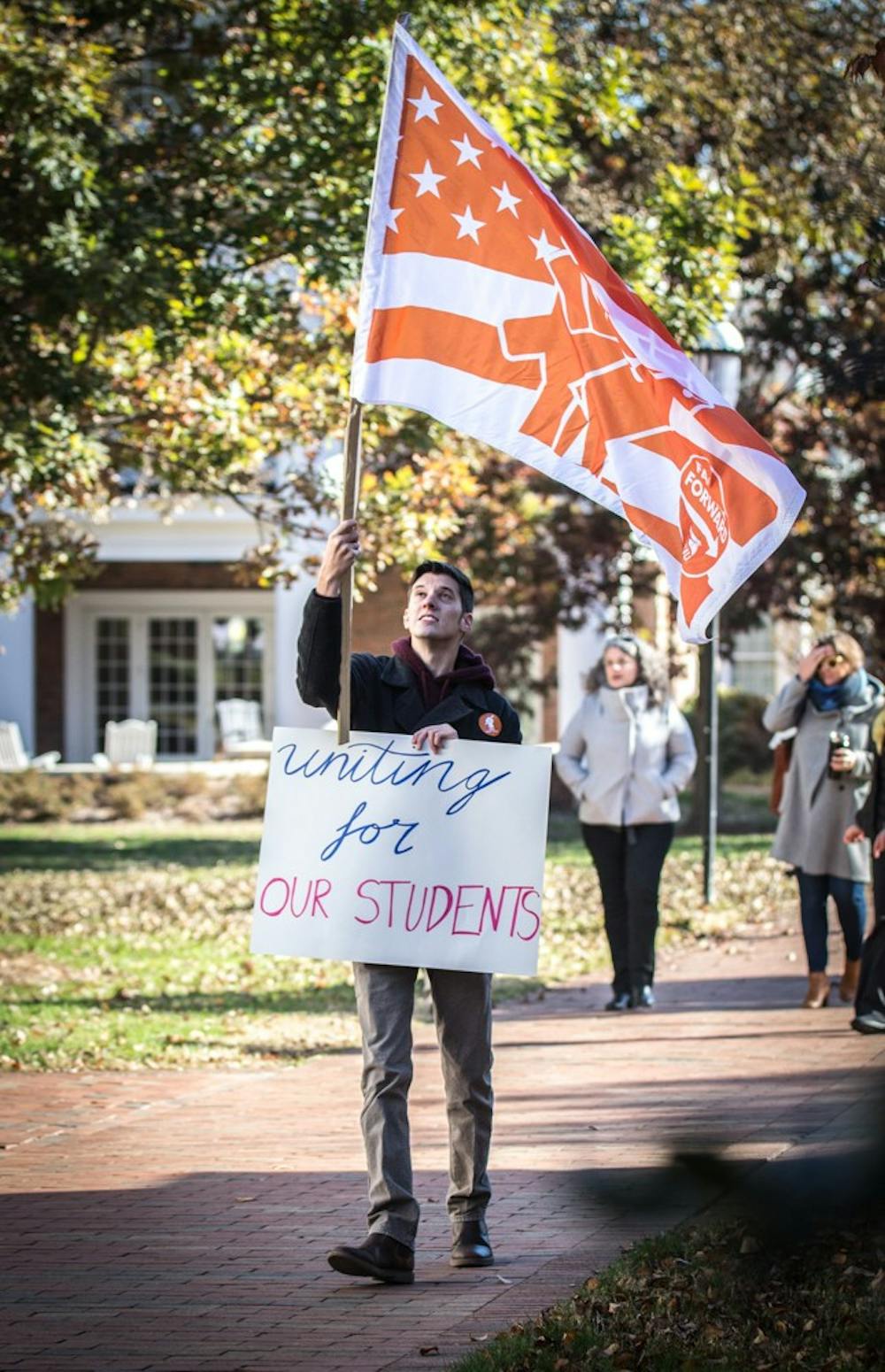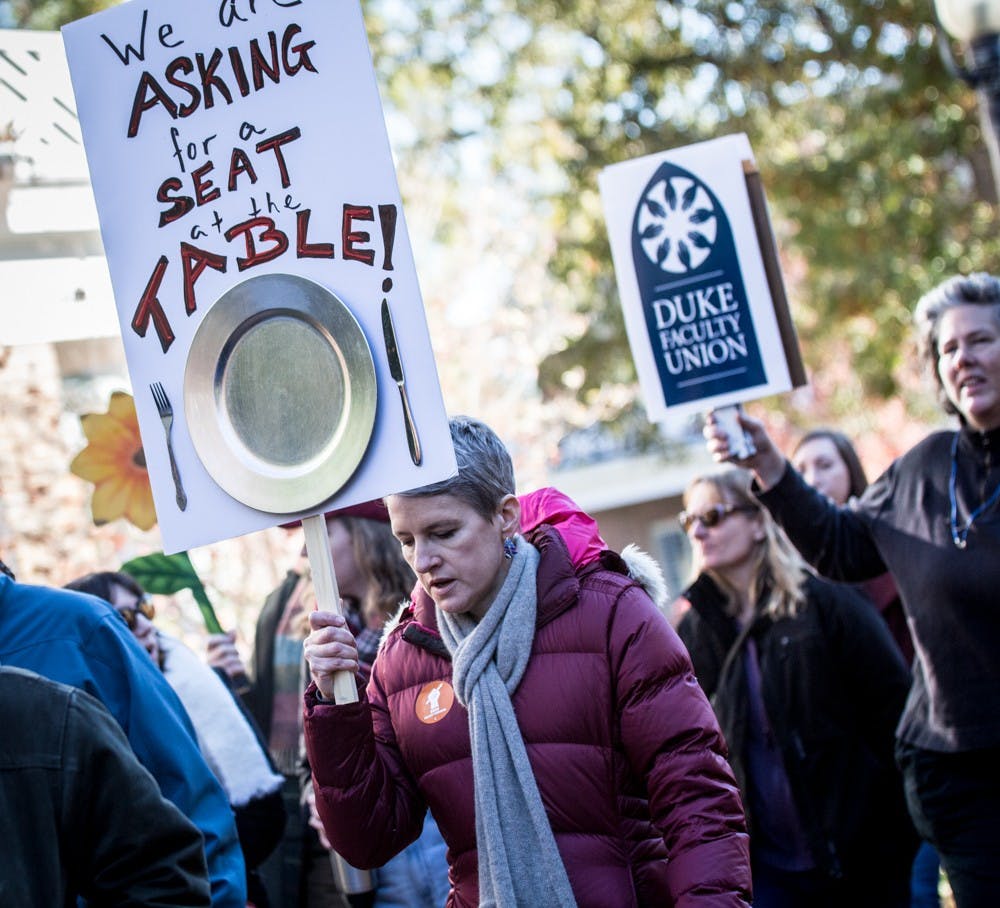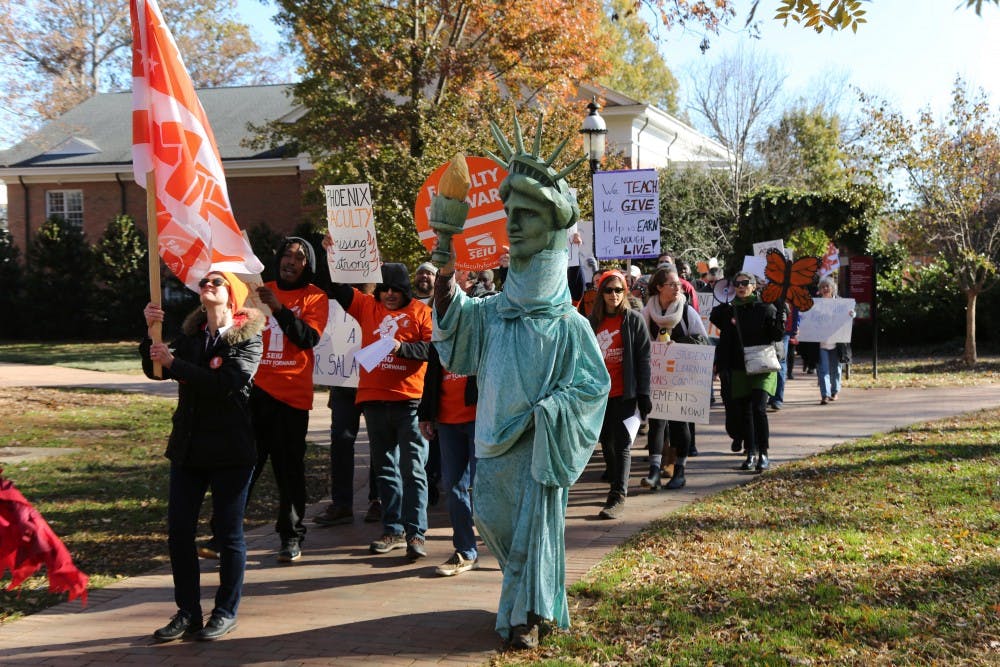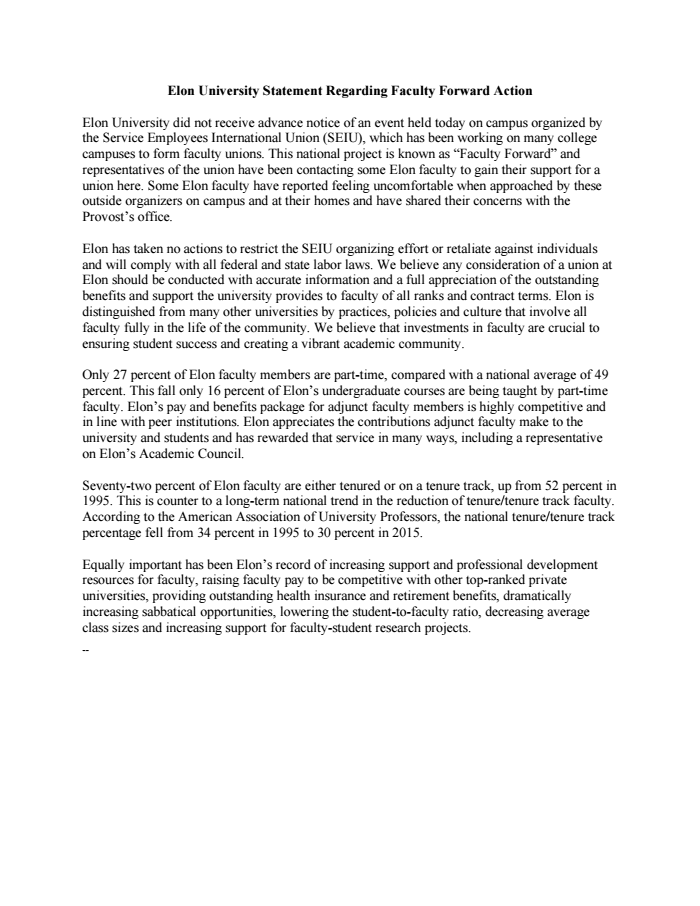Faculty members at Elon University are working toward creating the institution’s first non-tenure-track faculty union by the end of fall 2018.
The goal of the union, faculty members say, would be to provide both fair wages and job security to all non-tenure-track faculty, as well as push Elon’s administration to be more transparent in regard to salary and promotion decisions.
After spending the last few months gathering support, the Elon Faculty Forward movement went public on Thursday, Nov. 29, hosting their first event which started at Phi Beta Kappa Commons and ended in front of Powell Building.
The event began with the announcement that Elon Faculty Forward had just filed a Representation Petition with the National Labor Relations Board early Thursday morning. The announcement was made by Catherine Bush, an assistant professor of biology, who is on the Organizing Committee of the movement.
Since joining Elon in 2012, Bush says she has constantly found herself limited by what she said was the lack of resources provided to non-tenure-track faculty members such as herself. The "Professional Development and University Awards" section of the Faculty Handbook excludes Bush and other instructors and adjuncts from being able to take part in experiences such as sabbatical leaves, conducting research, participation in professional development and the teaching of multidisciplinary classes.
These restrictions have kept Bush from feeling like she has been able to fulfill a part of Elon’s mission statement to provide a “rich intellectual community characterized by active student engagement with a faculty dedicated to excellent teaching and scholarly accomplishment.”
Many students do not know the differences among academic titles and address most faculty as “professor.” But in academia, there are ranks based on a position’s level of commitment to teaching, research and service to an institution.
Some faculty members are hired at the “assistant professor” rank, indicating a tenure-track appointment where the faculty member will apply for tenure and the promotion to the rank of “associate professor" within four to six years. Tenure is an indefinite academic appointment that can only be terminated under extraordinary circumstances. It is meant to provide an institution with invested faculty members who have increased academic freedom.
According to the Elon 2017-18 Fact Book created by the Office of Institutional Research & Assessment, in terms of full-time professors, Elon has 201 tenured and 108 faculty tenure-track faculty members.
Adjuncts, instructors, lecturers and visiting faculty whose appointments generally de-emphasize research are not eligible for tenure or other benefits outlined in Elon’s Faculty Handbook.
A unionized Elon
To achieve the goal of creating a union, Elon faculty requested outside help from Faculty Forward, a project of the Service Employees International Union.
SEIU has more than 2 million members in industries such as child care, home care, custodian services, airport support, security and 120,000 members in public and private higher education as part of Faculty Forward. The project has helped certify more than 50 unions on public and private campuses around the country.
In January 2018, Faculty Forward representatives visited Elon and have been advising Bush and her colleagues ever since.
“They give us the best practices, and they allowed us to organize,” Bush said. “I am a biologist. I know nothing of labor relations laws. The reason we are where we are right now, as quickly as we have come is because of Faculty Forward and the expertise they bring.”
This expertise is brought by individuals such as Jacob Stanley, an SEIU organizer-in-training, who has been working with Bush over the last few months to garner support for the union.
The first step in certifying a union requires the movement to apply for a vote to be conducted by the NLRB, an arm of the federal government. In order for the vote to be approved, the Elon movement must create a bargaining unit, which lists all the non-tenure-track faculty eligible to join the union. The movement also needed to have "vote yes" commitments signed by 30 percent of those eligible faculty. This vote was filed on Thursday, Nov. 29.
Now that the petition has been filed, Elon administration will have the opportunity to debate the proposed bargaining unit. According to the Fact Book, there are 124 non-tenure-track full-time faculty members at Elon.
When the bargaining unit is agreed upon by the university and Elon Faculty Forward, the NLRB will conduct a vote for all the faculty within the bargaining unit. In order for the union to be approved, half of those casting a ballot must vote yes.
If approved, the union would take on the role of collective bargaining to develop comprehensive contracts that would benefit non-tenure-track faculty members. This would then be brought to the negotiation table with Elon administrators.
To swing the vote in favor of the union, Bush, Stanley and other pro-union faculty have been meeting with as many non-tenure-track faculty members as possible.

A supporter of Service Employees International Union (SEIU) marches in unity with Elon Faculty Forward during the organizations first public event on Thursday, Nov. 29.
They have been conducting door-to-door meetings with non-tenure-track faculty — both in their offices and at their homes — since October. Stanley, approached by Elon News Network on Nov. 8, while recruiting on campus, declined to comment.
After meeting with each prospective union faculty member, organizers ask the individual to sign a “vote yes” commitment or sign up for a membership card.
Bush was unable to provide the exact numbers of how many faculty members had been approached but said it has surpassed 100. She declined to provide the number of how many non-tenure-track faculty members had signed the “vote yes” commitment.
“I think of this as a democratic event. My job here is to have conversations about the union and their experiences,” Bush said. “We answer their questions about the union and tell them what we are doing. Either the faculty will want this, or they won’t, but it appears that they want this.”
But this apparent want for the union has sometimes been met by the fear of how the faculty members’ support for the union may affect their employment.
“We hear fears of retaliation, and that is not what Elon is about. That is not how it should be,” Bush said. “We are professionals. We should not live in fear that we can be replaced, and I reject the notion that we can be replaced.”
Any fear faculty members have of administration is a pivotal point in Bush’s campaign for this union.
“What we hear a lot is that, implicitly and explicitly, ‘We can replace you, you are replaceable,’” Bush said. “So, people who depend on these jobs for their livelihood for their families, they are fearful.”
On Monday, Nov. 26, a “Dear Colleague” letter was sent to all non-tenure-track faculty members explaining the purpose of the union and encouraging them to join.
The letter was signed by 50 faculty members who have gone public with their support for this union, they represent 20 undergraduate departments in three of Elon’s schools.
The letter outlined the union’s four main goals:
- Job security with the potential for long-term appointments and transparent hiring/promotional processes.
- Equal compensation with regard to pay and benefits as compared with tenured faculty.
- Access to educational resources such as private offices that are afforded to tenure-track faculty members.
- Provisions for research grants, increased student mentoring opportunities and professional development funds.
A campus voice published by ENN titled "Uniting as faculty for the best interest of our students and community," written by the Organizing Committee of Elon Faculty Forward summarizes the “Dear Colleague Letter.”
Provost Steven House, who oversees the faculty at Elon, refused to comment. An email sent by the Office of the Provost to ENN noted that House “has nothing to say regarding this topic.” Senior Associate Provost for Faculty Affairs Tim Peeples was unavailable for comment indefinitely.
But on Nov. 30, the day after Elon Faculty Forward’s first event, House sent a faculty-wide email addressing the movement.
“Yesterday many members of our community were surprised by a union action at Elon by organizers of the Service Employees International Union (SEIU),” House wrote. “We had heard reports that some outside members of the union were approaching faculty in hallways and at their homes, but we had no advance notice of a campus demonstration or their intention to file a union election petition.”
The email stated that over the week, the university will be providing information about its position on the SEIU labor union. A discussion regarding the topic is planned to be had during the faculty meeting on Friday, Dec. 7.
An official statement provided by University Communications said that Elon has "taken no actions to restrict the SEIU organizing effort."
Raghu Tadepalli, dean of the Martha and Spencer Love School of Business, said he believes the necessity of the union depends on the problems it is trying to solve.
“Typically, unions are formed because a group of people feel they are not being taken care of properly, their working conditions are not good or that people are not paying attention to their grievances,” Tadepalli said. “But Elon is not such a place.”
According to Tadepalli, who cited the Fall 2018 Self-Evaluation Report, the business school employs 12 full-time adjunct faculty members. After three of those faculty were approached by Elon Faculty Forward members, Tadepalli said he received emails notifying him of the meeting and expressing the individual faculty members’ intentions not to join the union.
One of those faculty members was Patrick Bell, a lecturer in the Management Department, who has dealt with SEIU in his professional career and is against the formation of the union.
"Unions create a permanent adversarial relationship between faculty and administration," Bell said. "It is in a union's best interest to keep this adversarial relationship because without conflict they aren't needed."
When in conversation with Bush about the union, Bell had a difficult time understanding how the union would positively affect students.
"It is in the best interest of the union to maintain a certain amount of conflict so they can stay relevant," Bell said. "How this might help Elon and Elon students is a mystery to me. I don't see any connection with collective bargaining with faculty and student success, ... I can't even draw a squiggly line between a union and our students being better off."
But not all in the business school agree with Bell.
Five faculty members in the business school have gone public with their support for the union by having their names published in the “Dear Colleague Letter.” Three of those faculty members, like Bell, are in the management department.
Senior Lecturer Amy Allen is the chair of the Department of Management and Entrepreneurship, and as a non-tenure-track faculty member, she was approached by both Bush and Stanley regarding the union.
After several conversations, Allen signed her “vote yes” commitment.
“I couldn’t think of a single good reason not to do it,” Allen said. “It will promote fairness and be in the best interest of the students and the university to move forward with this particular organization.”
Elon Faculty Forward went public on Thursday, Nov. 29 by hosting their first public meeting. The goal of the event was to raise awareness and support for the movement that is trying to create a union for non-tenure-track faculty members by the end of the year.
The different ways a union at Elon will affect campus remains uncertain. But comparisons can be made between Elon and the most recent private institution in North Carolina to form such a union, Duke University.
A union at Duke
Rumors of a union forming at Duke, about 40 miles east of Elon, began spreading during the summer of 2015.
Those rumors were confirmed when members of the Duke faculty requested the help of Faculty Forward. By working closely with representatives such as Stanley from SEIU, Duke’s Faculty Union formed by March 2016.
Of the 203 ballots cast by non-tenure-track faculty members at Duke, the vote was 174-29 in favor of the union in the election overseen by the NLRB. In July 2017, members of the union voted unanimously to ratify the DFU’s first contract. The contract was than negotiated and agreed upon by Duke’s administration — it runs from July 1, 2017 to June 20, 2020.
Similarly, to the goals being set out by the Elon movement, the DFU contract addressed job security, access to more university resources, regular performance reviews and the formal orientation of new non-tenure-track faculty members.

Supporters at Elon Faculty Forward's first public event on Thursday, Nov. 29, include members of Duke Faculty Union, which was formed in summer 2016.
“After the contract with Duke was implemented it has had a huge positive impact on my teaching,” said Nancy Kalow, a lecturing fellow at Duke, who served on the organizational board and is now on the executive board of the union. “I can engage more fully with the academic life of the university because I have three years of job security, finally. It has been a huge positive for all of us in the DFU.”
Two significant effects of the negotiated contract is an average 12 percent salary increase for all faculty members a part of the union at the time and the creation of a $50,000 fund for unionized faculty to pursue professional development opportunities such as conferences.
But these benefits come with a cost.
In order to be a member of the DFU, faculty members must pay 1.5 percent of their monthly paycheck, which can cost up to $50. Elon Faculty Forward has not yet released the potential cost of its fees.
Working closely with DFU during the contract negotiation period on the administrative side was Kyle Cavanaugh, vice president of administration at Duke. One of his roles was to reallocate the budgets for the different schools in order to compensate for the then-newly agreed upon contract.
“The funds have been coming from our normal sources like endowment,” Cavanaugh said. “Each school is responsible for its own operational budget and the additional costs from the union contract come from these budgets… I’m not sure I would say there has been a demonstrable impact on our budgets.”
In September, Duke’s endowment hit a record $8.5 billion, a 16.4 percent increase since 2015. According to the National Center for Educational Statistics, a branch of the U.S. Department of Education, Duke has the 13th largest endowment in the country. This is roughly 36 times more than Elon's 2017 endowment, which was nearly 232 million according to the university's 990 Form.
Following the signing of the contract, the relationship between the administration and DFU has remained stable.
“We are very fortunate that at this point in time we have a very productive and collaborative relation with the union,” Cavanaugh said. “We are in the second year of a three-year contract and we expect to have amicable relations going forward.”
The three-year contract has affected the lives of the roughly 250 non-tenure-track faculty members within the DFU.
During its formation, the union received support from Duke’s student body, this propelled the movement forward, which can now be seen at Elon.
The student side
During his freshman year at Elon, Chris Adamik fell in love with biology after taking a biodiversity course with a professor who soon became one of his favorite people at Elon. He enjoyed working with her so much that he later became her research student and teacher’s assistant. That professor was Bush.
As the two spent more time together, Adamik learned of the issues Bush faced as a non-tenure-track faculty member. After being told about Elon Faculty Forward during his junior year, Adamik immediately joined.
As a student ally, Adamik has been garnering support for the Student Alliance by having students sign a petition in support of the union.
“It is the students sitting in these classrooms and absorbing all of this information, who will leave here and change the world based off of what they experienced in their classroom. We often forget to say thank you,” Adamik said. “This is showing professors that we know that you are going through something and we want to let you know that you are not alone.”
Adamik turned in the petition to the office of Connie Book, president of Elon, on Friday, Nov. 30, with 270 signatures representing all four years and alumni. Adamik's original goal was to reach 500 signatures.
“With this union it's not just picking up the non-tenure-track faculty, it's picking up every single faculty member here,” Adamik said. “At the end of the day, it is these professors that are changing our lives. The university is the home that is housing the students, but it is the professors that show up to class that we will remember for years to come.”
These signatures won’t have a direct effect on the union’s certification, but Adamik hopes it will sway professors on the fence about voting yes and send a message to administration.
“It’s a statement to upper admin saying students are aware and students will stand with the faculty,” Adamik said.
Now that this is a public movement with a student petition, the SGA will be discussing its stance on whether to support the union or not.
“Faculty, students and administrators all have the shared mission to come together to make the strongest learning environment. If faculty feel that this union is the best way to achieve this goal then that is what they need to do,” said Kenneth Brown, SGA executive president. “If there are students and faculty out there that see a problem then they need to do whatever they need to do to make sure conversations are being had and decisions are being made for the best interests of the students and the faculty.”
The SGA will be holding a town hall meeting to discuss the movement and the organization's stance on the issue on Thursday, Dec. 6.
—
Updated at 5:30 p.m. on Dec. 4, 2018 to include updated information from Elon's 990 form regarding the university's 2017 endowment.
Updated at 6:13 p.m. on Nov. 30, 2018 to include statements from a staff-wide email titled "Message from Provost House regarding Faculty Union" sent by Steven House, provost of Elon.



